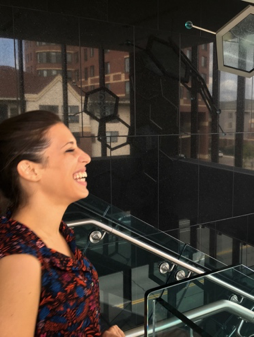
Noelia Diaz Sanchez first became aware of serious health challenges as a child. Her cousin was unable to move, eat, or play without the help of his parents, and when she was nine Sanchez learned that he was paralyzed by cerebral palsy due to malpractice at his birth. A few years later, her brother was born with Asperger’s Syndrome. “Why can’t the doctors fix them?” she recalled asking her parents. From a young age, Sanchez learned a difficult lesson: healthcare cannot solve everyone’s medical conditions. While most people might find this harsh reality unbearable, Sanchez took this news as a challenge she was determined to overcome.
“If no one is able or willing to do anything,” she reflected as she thought about her brother and cousin, “then I will go and find a cure myself.”
Today, Sanchez is on her way to a successful career in healthcare. She joined the C3 Fellows program during her first semester at MCTC. Having completed her Associate’s Degree, Sanchez has now set her sights even higher: she plans to attend medical school and become a neurologist. As a C3 Fellow, she set herself up to excel in pursuit of her career goals.

The Central Corridor College (C3) Fellows program connects college students in the Central Corridor with entry-level jobs in their area of interest at CCAP healthcare partners. This program has been immensely successful – it has matched nearly 250 students with paid field placements, and these students earn an average of $14 per hour, $6 more than Minnesota’s minimum wage. As of March 2017, 249 students are working in related fields and 231 of these positions are paid.
From Business in Spain to Health Care Abroad
Sanchez was born and raised in Madrid, Spain where her father owned a few businesses. At age 16, Sanchez enrolled in the Universidad de Malaga in southern Spain to study business. Although she had no trouble with the business curriculum, she found it impossible to ignore her lingering passion for medicine. The restrictive education system in Spain gave Sanchez two options: stay in her current program, or leave. “It wasn’t the right path for me,” she stated. She dropped out, feeling a need to start over.
Sanchez transitioned to a job working as the General Manager at Hispania’s Comfort Residence, a housing option for international students, most of whom were from the United States, studying abroad. Sanchez overheard enough of these students’ conversations to conclude that education and career opportunities were more diverse and accessible in the United States. She recognized an opportunity to start over. Sanchez took a leap of faith, leaving Spain with her husband to work towards a healthcare career in the United States.
Finding the C3 Fellows Connection
During her first semester at MCTC, Sanchez attended a job fair held on campus. She visited every career booth before stopping to meet Brian Mogren, C3 Fellows Program Director. Within a few minutes of learning about her career aspirations, Mogren sat down with Sanchez to help her reformat her resume and write a cover letter. By the end of that day, Sanchez had applied to four healthcare positions with Mogren’s help. Sanchez was thrilled and astounded by the dedication and energy that Mogren applied to connecting students to career advancement opportunities.
One key skill Sanchez learned as a C3 Fellow came from a conversation she had with Mogren immediately before her first interview.
“Think before you speak,” she recalled him telling her, “Take your time, speak slowly, and be confident.”

Dedication and Ambition
With the support of Mogren and the C3 Fellows community of health care professionals, Sanchez is making strides toward achieving her career goals. In the spring of 2017, Sanchez enrolled in 17 credit hours, including a 7-hour EMT course. She completed the course with an A and her certification and now aims to gain experience in the medical field as an EMT. Her ultimate goal is to transfer to the University of Minnesota to complete her bachelor’s degree, one step closer to attending medical school.
Sanchez declares that her goal to be a doctor is not about fame or wealth.
“I want to be a beacon of hope for all. So as a physician, I am unsure how to tell someone that they have a terrible illness,” she admits. “How do you tell someone that they are dying?How do you tell someone that you, as a doctor, cannot do anything to help them?”
Thanks to C3 Fellows, Sanchez is well on her way to supporting the health of the community that she now calls home.



